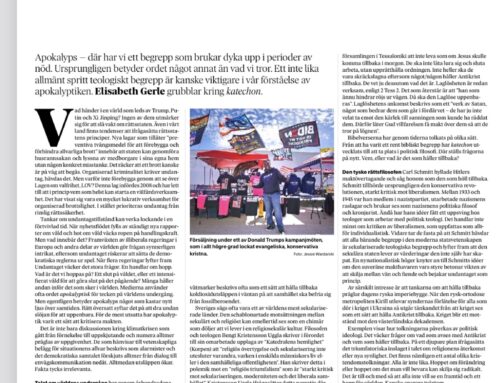224 LUTHERAN QUARTERLY BOOK REVIEWS 223
Passionate Embrace: Luther on Love, Body, and Sensual Presence. By Elisabeth Gerle. Eugene: Cascade Books,2017. ix + 322 pp.
Lund University professor Gerle opens new avenues for Lutheran debates over sexuality in this creative but careful re–reading on marriage, desire, and sexuality in Luther’s writings .While admitting that Luther’s vast corpus is not totally consistent in its positions, she argues that he innovatively refashioned medieval teachings. She employs writings by Gustav Wingren and other figures of the Scandinavian Luther Renaissance to argue against the view that Luther saw the orders of creation as static.
In doing this she makes new vistas possible. Gerle explores the teachings of Origen, Augustine, and Bernard on marriage showing ways that Luther was both indebted to and also transformed these traditions . Most wrote about longing and unful filled desire. Luther affirmed the goodness of created life and talked about the fulfillment of the desire for the other in the embrace of the beloved in everyday life. Rather than seeing the body as something that needs to be escaped in order to achieve salvation, Gerle argues that Luther saw the body’s goodness as it existed serving others in everyday vocations. This crucial difference in perspective separates Luther from monastic traditions.
The book also engages in an important re-reading of Luther’s ”Orders of Creation” theology. This theology was discussed in connection with the decisions of the 2009churchwide assembly of the .Evangelical Lutheran Church in America and continues to be debated within various Lutheran groups. In the same way, she brings a Lutheran voice to the stark but subsequently influential bifur cation between eros and agape set forth by Anders Nygren. Eros, agape, and friendship were all intertwined in marriage according to Luther. She then puts Luther’s theology in conversation with Carter Heyward and other feminist theologians who find signs of divine presence in erotic relationship.
Gerle’s book is a remarkable display of constructive Lutheran theological ethics and deserves wide reading as the church continues to struggle to find a relevant, confessional voice in matters on sexual ethics. What is remarkable about this book is its creativity in finding unexplored avenues, but also its care.
Gerle openly disclaims that Luther himself would necessarily support the conclusions she draws from possibilities present in his theology. She does convincingly argue that her proposals are within the possibilities offered by the contemporary application of some of the principles Luther advocated .
DUKE UNIVERSITY
DURHAM, NORI1I CAROLINA
Aaron Klink




